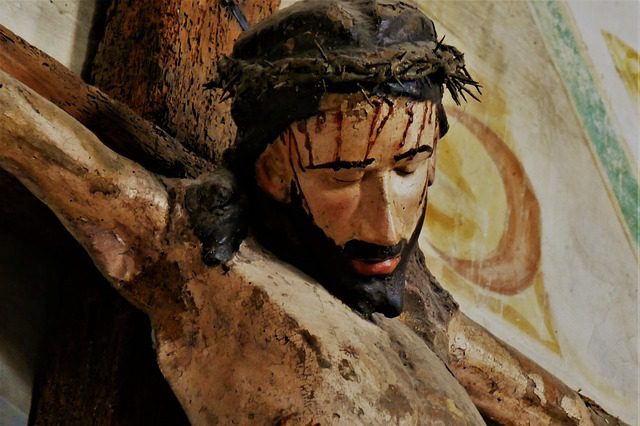
I met a man named Buster, who looked like Jesus.
No, I actually did. He appeared in my combox, commenting under the name “Buster” and with a profile pic that was an icon of Christ Pantocrator. I don’t know why I find that combination so funny. It reminds me of something out of a Coen Brothers film.
Buster the Jesus impersonator was confused about a post I wrote, a fanciful retelling of the Presentation in the Temple, meditating on the lowly estate of the Holy Family. The Holy Family were working-class people, after all. And in the pre-industrialized world with no social safety net, checking accounts or payday loan places to get you out of a jam, a working-class family traveling alone would be as helpless as a destitute one, and look and smell awfully scruffy. They were also from Nazareth, a backwater town in Galilee which was not itself a prized region– more or less the hillbillies of what is now Palestine. Joseph was descended from kings, but he himself was far from royalty. Mary was raised in the temple according to tradition, but she wasn’t a priest’s daughter; she was raised to be one of the servants, and betrothed to a man from back in Nazareth when she came of age. I pictured that family walking into the temple looking scruffy and exhausted, and how that would appear to a snooty cosmopolitan observer from Jerusalem.
Buster the Jesus Impersonator claimed I had been trying to compare the Holy Family to undocumented Mexicans. I hadn’t been. I have a few times, with other Gospel stories, because there’s plenty of room for the comparison to be made, but not in this particular piece. I was going for someone I might meet downtown at the Friendship Room here in northern Appalachia, and wonder what other part of Appalachia they were from. The kind of person who might wander into one of the churches in town and the churches would be afraid they were on drugs. I was meditating on how Christ comes to us in the ones we don’t expect.
“Why project things into the infancy narrative that simply are not there?” asked BJ, but he didn’t go into detail.
I didn’t. I made up a story to illustrate a point, and apparently the point has to be made more bluntly.
Jesus deliberately chose to come as a poor and disadvantaged person with no stately form or majesty that we should look upon him, a member of a poor and disadvantaged family from a sketchy part of the country. And we, in our own lives, must seek the Holy Family in the same places. Our souls depend on it.
I have noticed a lot of resistance to that idea, lately. I’ve seen people claim that the Holy Family was in the comfortable middle class (which didn’t exist in those days), that Jesus was especially attractive and even somehow looked like a white person, that the Holy Family never broke any laws. It seems to me that people are anxious to make the Holy Family respectable in the eyes of the world. And this is something that we must never do, because Christ Himself didn’t do it. Christ came to suffer with the disadvantaged, so that we might find Him in the disadvantaged and in our own suffering as well. Trying to write that mystery away is dangerously missing the mark.
Christ came to a teenage girl of a despised race in an occupied country. He could have come to a literal princess, the daughter of a Roman nobleman, but He didn’t. He came to someone the Romans regarded as sub-human. That girl could have gotten herself stoned for adultery for consenting to go along with His plan, but she did anyway. Christ is present in women, in minorities that the dominant class looks at in horror, in people who seem to us to be sinful and in people who are in danger. And blessed is the one who takes no offense.
Christ’s foster father was a working-class man from a dead-end part of the country, a man who was always one unfortunate accident away from destitution as the vast majority of people have been for the majority of history. That man was, on at least one occasion, forced to travel unexpectedly and shelter for the night with his wife in a stable. Christ is present in foster children. Christ is present in working-class people who live in constant fear of unfortunate accidents and destitution. Christ is present in people from sketchy parts of the country. Christ is present in people who find themselves homeless for the short or long term. And blessed is the one who takes no offense.
The Holy Family brought the poor peoples’ offering of two turtle doves to the temple– not the middle or upper class offering of a lamb from the sheep or the goats. Christ is present in people who have nothing materially valuable to contribute to their local community, and blessed is the one who takes no offense.
The Holy Family had to run away from Bethlehem to save the baby’s life. This was illegal. The law demanded that they stay and turn their baby over to be exterminated to prevent an insurrection in the name of a prophesied king, but they didn’t. They ran away to a foreign country, and whether that country was under Roman jurisdiction or not is irrelevant. Christ is present in people who break the law in order to migrate to safety, and blessed is the one who takes no offense.
The Holy Family raised their Child hidden in obscurity for thirty years.













